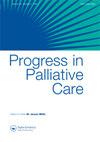听觉疗法治疗癌症患者化疗引起的恶心和呕吐:一项系统综述
IF 0.8
Q4 PUBLIC, ENVIRONMENTAL & OCCUPATIONAL HEALTH
引用次数: 0
摘要
目的探讨耳穴疗法对肿瘤患者CINV的治疗效果。方法对随机对照试验(rct)进行系统综述。截止到2021年9月,我们通过PubMed、AMED、Biblio Auriculo、Embase、CINAHL、CENTRAL、BVS、MTCI、am本文章由计算机程序翻译,如有差异,请以英文原文为准。
Auriculotherapy to manage chemotherapy-induced nausea and vomiting in patients with cancer: a systematic review
Objective To assess the effects of auriculotherapy for the management of CINV in cancer patients. Methods This is a systematic review of randomized controlled trials (RCTs). We searched MEDLINE via PubMed, AMED, Biblio Auriculo, Embase, CINAHL, CENTRAL, BVS, MTCI Américas, Web of Science, Scopus, PEDro, CNKI, CBMdisc, and CSJD-VIP databases up to September 2021 with no language restrictions. Results We included 25 studies with a total of 2,167 randomized participants. The results of the included studies suggest positive effects of auriculotherapy for the control of CINV, however 92% studies presented a high risk of bias overall. In the included studies, the most used auricular acupoints in the studies were the stomach (CO4) (n = 24, 96%), shenmen (TF4) (n = 23, 92%), sympathetic nerve (AH6a) (n = 15, 60%), spleen (CO13) (n = 14, 56%), liver (CO12) (n = 11, 44%), subcortex (AT4) (n = 10, 40%), and cardia (CO3) (n = 9, 36%). Conclusions It was not possible to assess the effectiveness of auriculotherapy for the management of CINV due to the great heterogeneity of the studies regarding the form of evaluating the outcome, the application of auriculotherapy, and the high risk of bias. It is suggested that robust clinical trials be conducted and reported according to the STRICTA guidelines.
求助全文
通过发布文献求助,成功后即可免费获取论文全文。
去求助
来源期刊

PROGRESS IN PALLIATIVE CARE
PUBLIC, ENVIRONMENTAL & OCCUPATIONAL HEALTH-
CiteScore
2.60
自引率
11.80%
发文量
24
期刊介绍:
Progress in Palliative Care is a peer reviewed, multidisciplinary journal with an international perspective. It provides a central point of reference for all members of the palliative care community: medical consultants, nurses, hospital support teams, home care teams, hospice directors and administrators, pain centre staff, social workers, chaplains, counsellors, information staff, paramedical staff and self-help groups. The emphasis of the journal is on the rapid exchange of information amongst those working in palliative care. Progress in Palliative Care embraces all aspects of the management of the problems of end-stage disease.
 求助内容:
求助内容: 应助结果提醒方式:
应助结果提醒方式:


